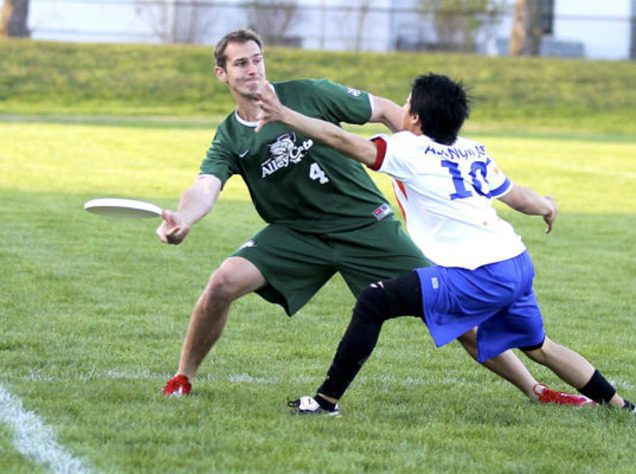Excelling In The Horizontal Stack
So, now that you know the ins and outs of the throws, positions, and rules, it’s finally time to dig a little deeper. At the end of the day, being a great athlete can only get you so far and you need a special combination of speed, skill, and intelligence to truly excel. This practically breaks down into an acute understanding of your team’s strategies and abilities. Just as soccer teams must keep their formations, so do Ultimate squads while on offense. Lower level teams can often spend entire games running around aimlessly, which can clog space and lead to sloppy possessions — even just the slightest bit of organization can entirely change the makeup of a a team.
On a very base level, every team begins with the Vert stack here as it’s mechanical, rigid, and dependable, even for players with low experience and game IQ. But, once a team is looking to add a little more fluidity and unpredictability to their offense, then you’ve got the Ho stack. If you’re unfamiliar with this stack, try digesting CoachUp’s handy guide in order to take your game to another level. Learning the horizontal stack is crucial for any aspiring Ultimate player — so don’t get left in the dust!

The Set-Up
The actual formation of the Ho stack is relatively simple in nature, but difficult in execution. Basically, instead of lining up vertically, the four cutters will spread across the field in different thirds. About 15-20 yards behind them are the three handlers, also each located in a third of the field. So, theoretically, the left Handler will be responsible for throwing to the center Handler, the left Mid, and the center-left Mid. Additionally, the center Handler will swing the disc to both the left and right Handlers, and the left-center and right-center Mids. Finally, the right Handler will throw to the center Handler, center-right Mid, and right Mid. Of course, there will be opportunities and breaks in the defense, but, typically, these will be your targets the majority of the time. Seems simple, right? Well, now we’ll break it down by position and walk you through it step-by-step.
The Handlers
The Handlers, as we ran down in our in-depth article found here, have one, major responsibility: keep possession. Fully functioning offense actually serves as a pretty great defense — opposing teams can’t score without the disc, obviously! There’s something to be said for a fluid, patient offense that searches for revealed options instead of forcefully manufacturing them.
In all these circumstances, the three Handlers will, in a way, be in charge of their own mini-stack, as the two cutters in their section will move in and out within the offense. Generally speaking, the Handlers will look for the in-cut first, then the out-cut second — if there’s more time on the stall count, they may even look for a third cut, but, in most scenarios, they’ll swing it to a new Handler. Most of the onus in the success of a Ho stack falls on the cutters, as the Handlers don’t do much differently here than they do in the Vert stack, but they must never lose focus or get sloppy.
The Cutters
Now, this is where the Ho stack typically flourishes or fails — the cutters. These players must constantly be moving at all costs, remember, when you stand still, the defense has an impossibly easy job. In particular, you’ll want to have your athletes with the most endurance in the middle because they’re technically in two different thirds of the field. Ultimately, you’ll have three different pairs of cutters on the field during a horizontal stack — the first being the left + left-center pair, second being the left-center + right-center pair, and, finally, the right-center and right pair. When the disc is in any of those pairs’ zones, they must work in symphony in order to create space and stretch the defenders.
For example: if the disc is in the middle of the field, the two center cutters need to moving in opposite directions at all times. As soon as the disc gets swung to the central Handler, one cutter must break towards the disc as the other cuts deep. If there’s no immediate throw, either deep or short, the Handler will either look to swing, dump, or reset. Then, the cutter who unsuccessfully came in, must move out of the middle, try to find open space, or cut deep. Once the deep cut is not used, he or she must also cut back in towards the Handler in order to recycle back into the space no longer used by their partner. As this happens, the former in-cut will go deep.
These players, no matter what zone the disc is in, must be moving constantly and attempting to find open space on the field. Additionally, remember that defenders are absolutely unable to guard you effectively in both directions. Thusly, if you’re going deep and they’re giving you the underneath throw, turn around and take it. Or, conversely, if your defender is face guarding you and trying to stop any short throws, take him deep and make him chase. Cutters must be in rhythm and constantly evolving to the tide and momentum of a game. The very best cutters adhere to a strategy as best as possible, but will not shy away from modifying it on-the-fly when given a great opportunity to do so.
Defense against the Horizontal Stack
For defenders guarding Handlers in the Ho stack, they’ll want to make sure they contain the disc as best as possible. This basically breaks down to say that these defenders must keep the disc in front of them at all costs — don’t guard your Handler too close when they don’t have the disc, as it will make a simple cut upfield easy. Additionally, defenders will force the Handlers in a specific direction of choice, often decided before the pull. This way, they hope to effectively cut-off an entire third of the field.
For example, if you’re forcing left on the middle handler — which equates to not standing in the middle of your assignment, but all the way to his right side — then he or she will only be able to look for options in that direction and his offensive teammates can only funnel towards him there as well. Above all, however, communication is incredibly important — force the wrong way and your teammates could be hung out to dry. Pay attention pre-pull and make sure that you’re keeping your assignment in front of you at all costs and you’ll be OK.
As for those defending the cutters, it’s not particularly easy one way or the other. The only thing you must attempt to at all times is this — do not give up the deep throw. If you’re caught on the wrong side of your cut and go deep, the point will have been, most likely, lost. On the other hand, if you cede the in-cut to your defender, you’ll still, hopefully, have the ability to stay close and make a play, but, at the very least, will keep the pressure on the offense to complete more passes. In the end, your job as a defender is to make the offense work longer, harder, and more accurately. Don’t try to manufacture turnovers, as that will lead to overcompensation and, in turn, a mistake. Let the mistakes come to you and then pounce!
(Related: Read about making efficient cuts here.)
Huddle Up
At the end of the day, it can tough to describe the subtle nuances of the Horizontal stack just using words, so get out there and start working! Your most important allies are quick changes in direction and creativity! Your goal should be to leave your defender’s head spinning — don’t be predictable, and don’t stay in the way! Cut in, if you don’t get a pass, get out of there and make a new move into space. Ultimate can be exhausting, but incredibly rewarding if you work hard enough. So, keep that disc moving, legs churning, and mind spinning and you’ll find success, guaranteed.
If you’re still struggling with the difficulties of fitting into or understanding the Horizontal stack, then consider booking one of CoachUp’s private trainers to help you out along the way. Our talented team of athletes will get you throwing with confidence, hitting the cutters, or making well-timed deep runs in no time — what are you waiting for?
(Thanks to Major League Ultimate for the gif!)
How useful was this post?
Click on a star to rate it!
Average rating 4 / 5. Vote count: 1
No votes so far! Be the first to rate this post.




